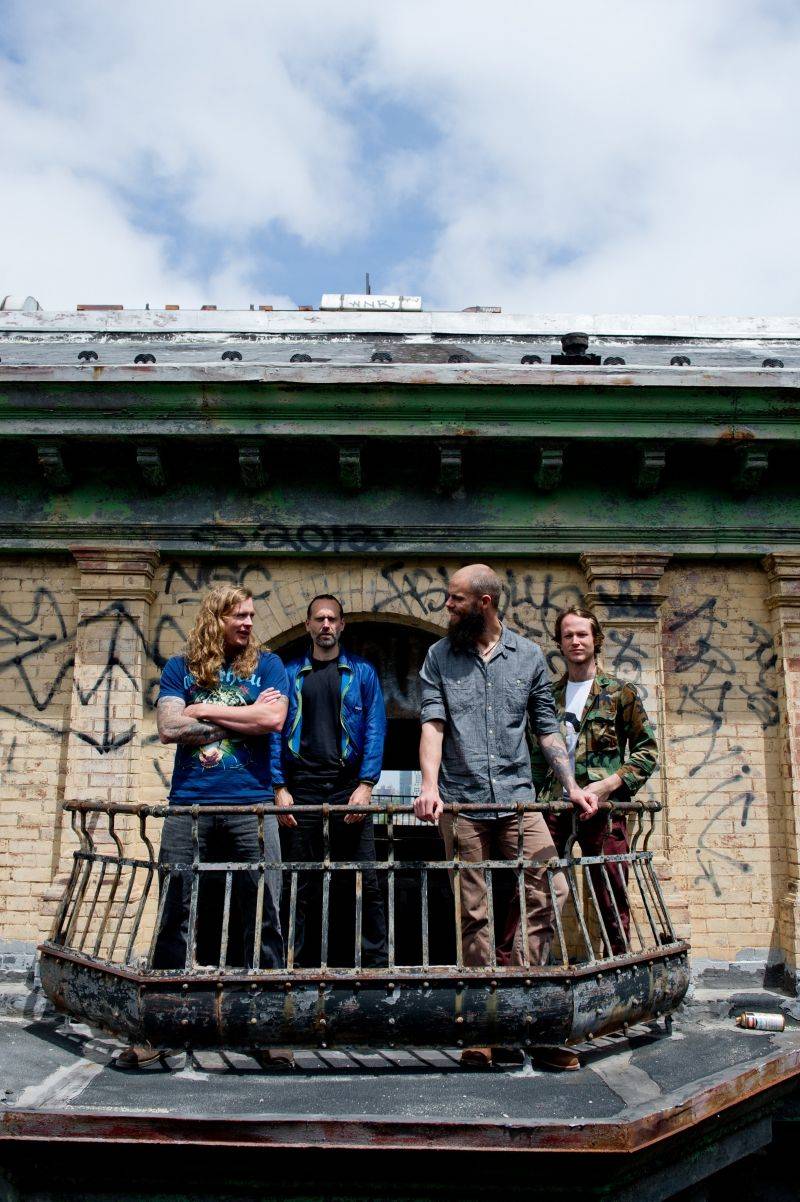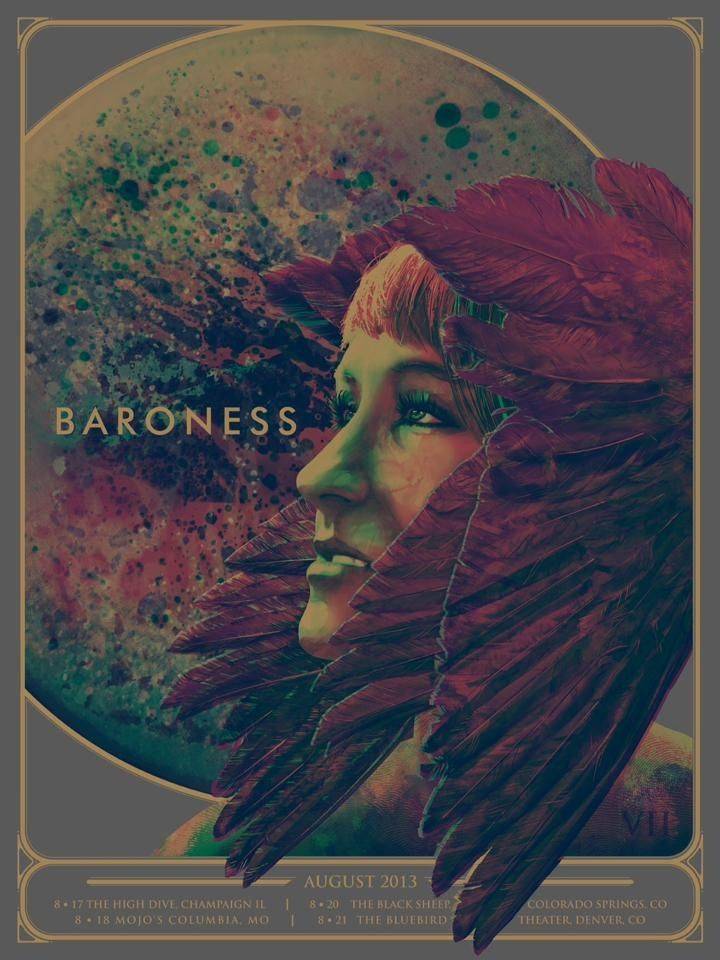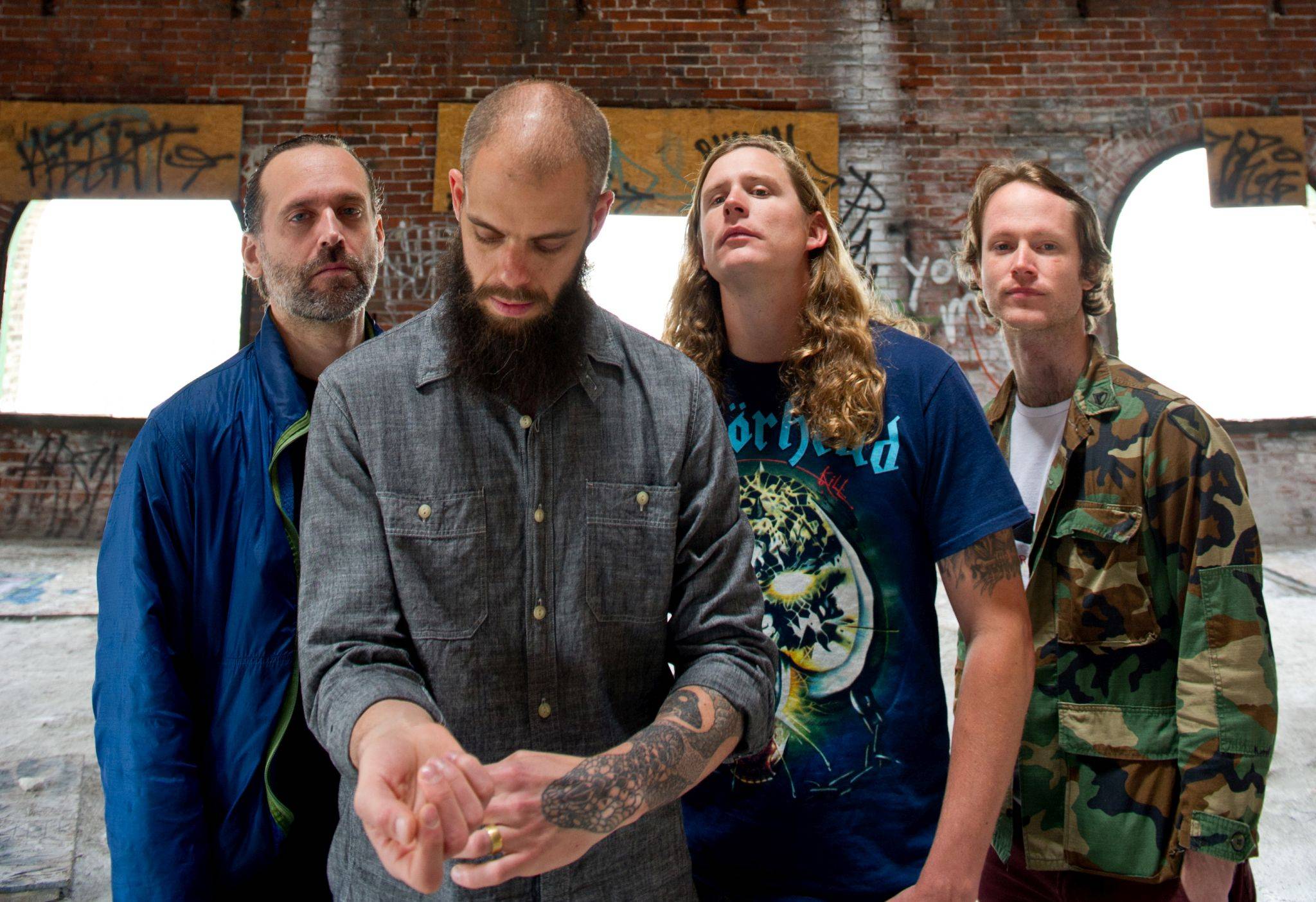A year and a day ago, a bus carrying musicians and a crew crashed off a goddamned cliff in England. Fast forward to now, and Baroness has a new rhythm section and a new perspective on life. They’re here to live it, and get shit done. 100% work, 100% play. The accident has been widely documented, so I won’t go through the tedious task of recounting details; however, the band posted this yesterday, and before we get to the inspiring and awesome interview I had with lead singer/guitarist/lyricist/visual artist John Dyer Baizley, I’d like to republish it in full.
Today is the anniversary of the Baroness tour bus crash, a day on which nine passengers, all musicians and crew on a tour-bus bound for Southhampton, UK, could have lost their lives. The miraculous and astoundingly simple fact is that we all survived. While I will not speak directly about what anyone individually has gone through since the moment of impact, I can easily say that we have all gotten better and moved on. Yes, there are aches, pains, anxieties and frustrations that accompany us to this day, but they seem somewhat trivial when compared with the imminent end we all thought so certain as our bus plummeted off the viaduct to the ground below. None of us has had a particularly easy year, we have all been forced by matter of circumstance to gain a immense level of respect for the severity of our accident. We have all had to heal, in vastly different ways. Similarly, we have each taken uniquely different paths in the wake of rehabilitation and recovery. It comes as a great relief to me personally that, in spite of all the trauma and confusion, each of us has, in our beautifully individual way, powered through the dreadful and dark imprint that August 15, 2012 left on us. The strength and focus that each one of us found after that day has been inspiring; we each took our due time, defined a goal through which we could move past that moment, strapped on our proverbial boots and marched forward with resolutely. For some, it took a matter of weeks to get back on tour again; for others it meant changing the personal and professional course of our lives. Not one of us faltered; and we have, each of us, earned this bittersweet anniversary with the help of one other, with our own strength of conviction, our mutual support, and with a passionate tenacity to appreciate and make something positive and constructive of our lives, for which we now have a much deeper appreciation. I love each of you more than I have the capacity to write here, and I can barely relate the gratitude I have for all of those family members, friends, and total strangers who lent us a hand along the way. You were there when we needed it most.
For my brothers and sisters of the Brassknocker Hill crash. We are bound to one another. Raise a glass, embrace those you love, appreciate the delicate and all-too-brief magnificence of life.
Once more. Till the wheels fall off. . .
Pete Adams
John Baizley
Allen Blickle
Jason Lupeituu
Yvonne Maclean
Matt Maggioni
Norman Markus
Marek Sarba
Lindsey Zakopal
Smile Politely: So, you’re in New England right now. How was Boston?
John Dyer Baizley: Boston was killer, probably the show of the tour so far.
SP: Do you think you get special support up there because you’re based in Philly now, or did it just happen to be that way?
Baizley: Sometimes it just works. You can cut em up any way you want, but there’s really no way for me to tell why it works in one town and doesn’t in another, you know? The shows have all been very good, but that one was great.
SP: How’s the tour been in general?
Baizley: It’s been awesome. I’ve really got no complaints whatsoever. We’ve got a really, really great crew out on tour with us, the routing that we’ve got is pretty easy, the weather’s been nice, we’ve been doing a things on our off days. It’s just great.
SP: What exciting adventures have you had on our off time?
Baizley: We’ve been going to roller coasters, art museums, the beach, Niagra Falls — whatever we can squeeze in, we’ll do. I try to post pictures. There’s a lot of bands that don’t do shit on their days off, I try to show that we’re not one of those. We try to enjoy our time and do things that are fun to do before ten PM when most of us just want to party all night.
SP: How’s the chemistry with the two new boys like?
Baizley: It’s great. They’re really good musicians and really good people, we all get along. It’s almost unbelievable how quickly everything came together.

SP: What are the things you’ve missed most about being on the road that you’re enjoying now that you’re back at it?
Baizley: The fucking ADVENTURE! A new place every day, new people, new places to eat, new things to explore. Each city’s got its own flavor. I’ve made it an obligation of mine to try to get up as early as possible to see those things, if it’s convenient to do so. Being grounded as we were and stuck in the same place, you miss that. I don’t think of myself as a particularly social person, but while I’m here on this earth I’d like to do and see as many things as possible. The good things, bad things, disgusting things, enlightening things…all of it. Bring it on.
SP: So, has it been painful, or a pain in the ass, to have to re-live the experience of the crash in all these interviews I’ve been reading? Or has it helped you find some sort of catharsis or closure?
Baizley: Every once and awhile, if I’m doing a big string of interviews, and I do like 8, 9, or 10 — I feel like I’ve gotten kind of stock in my response to it. And that’s disrespectful to the severity of what happened to us. But, on the opposite page, I’ve been forced to talk about it so many times, and I’ve chosen to be pretty open about everything — it’s actually helped me immensely on the mental front, dealing with it. Resolving some of the anxiety issues that are undoubtedly going to dog this issue for me eternally…I liken it to the way that sometimes you have a fear, and the only way to deal with it is to embrace it and confront it. And that’s what the press has actually helped me with. So, thank you press! You’re actually good for something. [laughs] Besides ticket sales or album reviews. I’ve had to talk through the story so many times it’s lost some of the negative power. But I’ve lost none of my respect for it, and its impact on my life.
SP: It’s been encouraging and empowering for me to see the resilience and strength in your music be put into action through your actions after that accident.
Baizley: Well, if you’re gonna fucking talk the talk, you better walk the walk, you know what I mean? I think it behooves the musician to write something real. Whether obtuse, direct, narrative, or poetic, I think we should believe in what we do. And I think that, personally, I would be doing a disservice to our music if I let something as superficially difficult as physical injury or mental trouble stop me from doing something that helps and builds constructive things in my life. At the end of the day I’m just trying to set a good example for my family, and my friends, and the people around me. It seemed like the best way to do it. It’s a win-win. I benefit from it, and hopefully there’s other people out there who can look at what we’re going through and find some parallels in their own life and say, “Hey, look! You don’t have to lose hope because you’re completely battered and broken! You can pick your pieces back up, stuff ‘em back into shape, and fuckin’ soldier on.” That’s what we do. That’s life, you know?
SP: It’s been nice finding more bands over the past ten years who are not only heavy as hell with their guitars, but they can have a message (be it in their lyrics or outside the text of the song) that is positive and life-affirming, rather than some of the nihilistic shit (that I do love) that focused and romanticized negativity so much.
Baizley: Well, look at it. Look at some of the second and third wave bands. There was a bleakness to the message, and there was no answer. There was this vague hyperbolic questioning and recognition of the human condition and how miserable and painful our lives are. Sure. You know, I get that. It is. We all suffer on a daily basis, whether it’s just stubbing a toe, losing a family member, or fucking falling off a cliff in a bus. It hurts. It hurts to be alive. It seems to me that if that’s the case — if you recognize and can articulate things in that way, the very least you can do is at least try to start coming up with some answers. Try to find the silver lining. Try to find a way to take some of the negative and create something positive. I think music is a wonderful thing for that. I’m not a religious person. I don’t go to church. God doesn’t do it for me. My church is a venue. A club. A festival. It doesn’t matter — somewhere where people are producing, creating something that can inspire someone. Or somewhere where people are listening to and receiving those transmissions. We celebrate. Even…I’ve seen Slayer, or even much more brutal bands than Slayer, and the fans at those shows…It’s not a miserable experience. It’s a joyous experience. And that’s to be respected.

SP: The positivity I get from your records is only one of the things that sets you apart — you remain heavy, but are unafraid to break genre codes.
Baizley: Well, look. Who got into this music to be fucking orthodox about it? When I got into it, it was about being punk rock. And that was about doing whatever the fuck you wanted whenever the fuck you wanted because it worked for you. And that changed — the follow-through, the way that unfolds changes as the years go by and you have to adapt to it, but one thing remains true: if there’s a rule…I’m gonna fucking challenge it. Some rules work. But, genre rules? Fuck that. We’re here to write good music. Not good styles.
SP: I must say, you’re the first band I’ve seen in years to play so many dual harmonic solos without either irony or cheese.
Baizley: [Laughs] We’re trying to keep that alive, man. [Laughs]
SP: There’s a goodness to it.
Baizley: At the end of the day, don’t we want to be able to — we listeners — want to kinda be able to hum along with things, right? Like, I say “Beethoven,” and you know — you can sing — the famous Beethoven “riff,” if you wanna call it that. I say, “Black Sabbath,” you can sing a Black Sabbath riff. Pete [Adams] and I are just trying to do that with harmonized guitars. I want people to sing them. Almost think of them like vocal melodies. If you get too fast and fancy you start to lose the power and the joy that we put into them. Dragonforce is fine, they’re great. Forget it, I’ll never [be able to] do that. But, I think what we’ve lost sight of in recent years is the hooks. The things that you walk out of the club retaining. Beyond just “Oh my god, they were so technical.” That’s not a compliment. I want people moving. I want moving inside, moving outside. I want people to remember what happened.
Baroness: “March to the Sea”
[[mp3 baroness_march_to_the_sea]]
SP: Some bands settle on a sound, it seems, and people who are into that style or sound, don’t actually give a shit about the songs. On Yellow & Green, every track you seem to serve what the song itself wants, rather than being preoccupied with making it as heavy as possible.
Baizley: That was the point. When we got older, we realized that songs are like these mini-stories. Each one of em’s got its own arc, or focal point. For us, at the point at which we wrote it, the interesting and challenging thing was to serve the song rather than serve the musicians.
Baroness plays the HighDive on Saturday. Tickets are $15 in advance, $17 at the door. Show starts at 7:30 p.m. with opener Royal Thunder.








